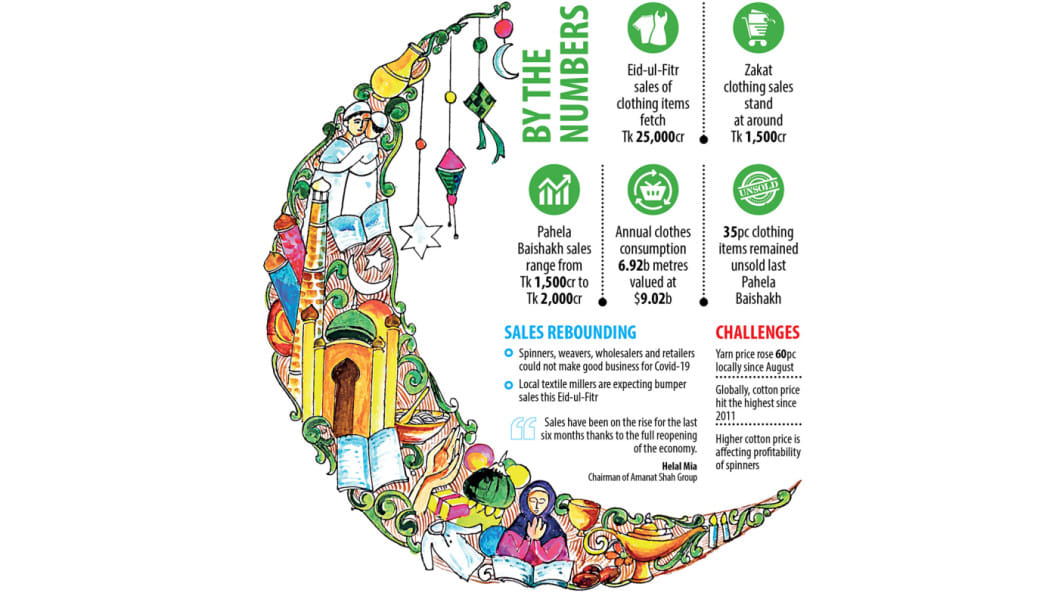Textile millers expect bumper sales this Eid

Local textile millers are expecting bumper sales in the upcoming Eid-ul-Fitr, the biggest shopping season in Bangladesh, since people are apparently set to celebrate the festival joyously as Covid-19 has petered out.
Two mega-events, namely Eid-ul-Fitr and Pahela Baishakh, which celebrates the first day of the Bengali calendar, make up the biggest shopping season in the country.
But spinners, weavers, dealers, wholesalers, and retailers across the country could not make a good business because of on and off countrywide lockdowns in the last two years because of the higher prevalence of coronavirus caseloads, dampening the mood of the people.
But this year might be different as infections have declined sharply and only one person died because of the virus yesterday, the first death in five days.
The improvement in the coronavirus situation in recent months has restored the confidence of businesses, and textile millers are sanguine as most of the local consumers buy clothes to celebrate the occasions.
Spinners start selling yarns to weavers more than two months before the start of Ramadan as weavers target to finish the production of fabrics a lot earlier so that they can supply the finished goods in the first week of the fasting month, which begins next week.
Weavers are now at the end of their sales of textiles as Eid-ul-Fitr is only a month away. Many are still busy making the textile material and will send them to the stores in Baburhaat, Shekherchar and Gausia in Narsingdi, Belkuchi in Sirajganj, Tangail, Chattogram and other major wholesale hubs across the country.
More than 2,500 power looms are running at full capacity alone in Madhabdi, Chowala, Baburhaat, Shekherchar as well as Araihazar of Narayanganj to produce fabrics.
Usually, textile millers sell fabrics like saris, lungis, and salwar kameez and the fabrics used in making trousers and shirts worth Tk 25,000 crore in the run-up to the Eid-ul-Fitr festival alone.
Of the amount, nearly Tk 1,500 crore worth of fabrics are donated as part of Zakat, said Monsoor Ahmed, chief executive officer of Bangladesh Textile Mills Association (BTMA).
Zakat refers to the obligation that an individual has to donate a certain proportion of wealth each year to charitable causes.
"I am expecting a very good sale this year as the Covid-19 situation has improved," said Helal Mia, chairman of Amanat Shah Group, a clothing maker that sells saris and lungis in bulk quantity.
"The sales have been on the rise for the last six months thanks to the full reopening of the economy."
Almost 35 per cent of the products made ahead of Pahela Baishakh last year remained unsold, but weavers are hopeful this year that they will be able to clear all of the goods.
Khorshed Alam, chairman of Little Group, a spinner, says products aimed at the Eid-ul-Fitr market have already been made and sales would soon pick up.
The annual consumption of fabrics in Bangladesh is 692 crore metres considering the current population of the country. The value of the quantity is $9.02 billion and nearly 20 lakh people are directly employed in the primary textile sector, according to Mohammad Ali Khokon, president of the BTMA.
However, the sales ahead of Pahela Baishakh, which falls on April 14, may not fully recover since the event will be celebrated in the middle of Ramadan.
The sales ahead of Pahela Baishakh, which fetches Tk 1,500 crore to Tk 2,000 crore for clothing sellers every year, will be 40 per cent of the pre-pandemic level because of Ramadan.
"But the preparation for both festivals is going on in full swing," Khokon said.
Meanwhile, higher yarn price has emerged as a headache for the primary textile sector.
Spinners have raised the price of yarn by as much as 60 per cent since August, owing to the price hike of cotton in the international market for the demand surge.
The item may become costlier after the supply chain disruption caused by the Russia-Ukraine war sent the price of cotton to more than a decade high last week. Bangladesh relies on global markets for cotton amid scanty local production.
As a result, many cottage and small fabrics mills, dyers and weavers are struggling to run their operations despite the business recovery.
"The high price of cotton is affecting the profitability of the clothing business," said Mia of Amanat Shah Group.

 For all latest news, follow The Daily Star's Google News channel.
For all latest news, follow The Daily Star's Google News channel. 



Comments